九年级第六单元短语和句
九年级英语第六单元知识点

九年级英语第六单元知识点一、重要词汇1.along with == together with 连同、、、、、、一起; 随同、、、、、、一起He came along with some friends .I sent the books along with the other things .The young people are dancing happily along with the music .主语为单数;后接along with时;谓语动词用单数形式..The apple; along with some grapes ; has gone bad .2. dance to 和着、、、、、、的节拍跳舞; to “按照;随着”I like music that I can dance to .The students are doing eye exercises to music .dance with sb. 和某人跳舞Would you like to dance with me3. kind of === a little 稍微; 有点; 有几分I’m kind of tired .a kind of 一种This is a kind of new washing machine .all kinds of 各种各样的There are all kinds of animals in the zoo . different \ many kinds of 不同\ 许多种类的There are different \ many kinds of flowers in the garden .what kind of 哪种类型what kind of book do you likeof that kind 那种类型的;放在名词后修饰名词I like the color TV set of that kind .be kind to sb 对某人很友好Miss Zhang is very kind to us .4. what’s the name of …、、、、、、的名字是什么What’s the name of the movieWhat’s the name of your babywith the name == named== called 名叫、、、、、、;叫做、、、、、、He has a dog with the name “Tom” .in the name of 以、、、、、、的名义He attended the party in the name of his father .5. remind 动词; “提醒;使想起”1 remind sb. 提醒某人I can’t think of his name ; can you remind me2 remind sb. to do sth. 提醒某人做某事Remind Jenny to bring her laptop手提电脑when she comes .What you said remind me to buy some fruit .2 remind sb. of \ about sth 提醒某人某事; 使某人想起某事Can you remind us of your plans for the holidayThe song reminds me of my childhood in the country .3 remind sb. + that 从句提醒某人、、、、、、She reminded me that we had met before .Please remind tom that he should get up early .6. think of 1 想起; 记得I can’t think of his name at the moment 现在.I thought of my hometown when I saw the beautiful scenery .2 认为What do you think of ……=== How do you like ……你认为……怎么样3 考虑; 关心He always thinks of others .think about 考虑think over 仔细考虑7.stand 1 “忍受; 忍耐” ; 常与can 或can’t连用stand sth \ sb 忍受某物\忍受某人I can’t stand the hot weather here .Most of us couldn’t stand the loud music .stand doing sth 忍受做某They can’t stand working all day and all night . stand sb . doing sth .忍受某人做某事I can’t stand people dropping litter 垃圾.2 站; 立He was too tired to stand .3 座落于…… ; 位于……The small village stands at the foot of the mountain .8. do; does; did 放在动词前;起强调作用;意为“的确;真的是”I do like this blue hat .They did come yesterday .Do please turn off the light when you leave the house .9.be known\ famous to sb. 为、、、、、、所熟知Yao Ming is known to all the Chinese people .be known as 以、、、、、、身份或职业而出名He is known as a writer .be known for 以、、、、、、物而出名The place is known for its green tea .10.on display = on show 介词短语;“展览;陈列”His pictures are on display in London this month .The things on show were discovered hundreds of years ago .11. little ; a little ; few ; a fewlittle表示“少; 少得几乎没有” ; 修饰不可数名词.few也表示“少; 少得几乎没有” ; 修饰可数名词的复数.a little 表示“有一点点; 但数量不多” ; 修饰不可数名词.a few也表示“有一点点; 但数量不多” ; 修饰可数名词的复数.He often feels lonely ; because he has few friends here .There is little milk in the fridge 冰箱. We have to buy some .---How soon will he be back --- In a few days .There is a little water in the bottle ; you can drink it .12. whatever=== no matter what 无论什么;无论怎样Whoever == no matter who 无论是谁;无论什么人Whenever == no matter when 无论什么时候;无论何时Wherever == no matter where 无论哪里However === no matter how 无论怎样Whatever \ no matter what you do ; you should always do it well .Wherever \ no matter where you go; I will always follow you .Whenever \ no matter you arrive in Beijing ; please call me .13. suggest 动词;“提议;建议”1 suggest to sb. 向某人提出建议What did you suggest to the manager2 suggest doing sth. 建议做某事I suggested going home at once .3 suggest + that 从句I suggested that we should leave early for the station .14. luck 名词; “运气; 好运; 幸运”Good luck to you . 祝你好运.by good luck 幸亏; 侥幸try one’s luck 碰碰运气lucky 形容词; “幸运的” a lucky dog 幸运儿I was lucky enough to catch the last bus .What a lucky boybe lucky to do sth 幸运做某事I am very lucky to have such a good teacher .luckily 副词; “幸运地; 幸亏; 侥幸”Luckily ; I got to the station on time .15. expect 及物动词;“期望、期待、预料”1expect to do sth. 期待做某事;希望做某事I expect to be back on Monday .2 expect sb. to do sth . 期望某人做某事They expect me to work on Saturday .3 expect + that 从句期望、、、、、、;期待、、、、、、..We expect that it will be sunny tomorrow .16. taste 1 系动词;“尝起来、、、、、、”The fish tastes delicious .2行为动词;“品尝”She tasted the soup and added some salt .3 名词;“味觉;鉴赏力”Her taste is keen 敏锐.17. stay away from 动词短语;1 不吃某类食品The doctor advised him to stay away from fattening food .2 不要靠近;走开;避开Stay away from me ; I’ve got a bad cold .Teenagers should stay away from drugs .18. even if ====even though 连词;“即使;纵然”; 引导让步状语从句..I wouldn’t give up even if I should fail a third time .I can still remember even though it happened so long ago .19. shock 动词;“使震惊”1 be shocked at sth 对、、、、、、感到震惊They were shocked at the terrible sight 一幕.2 be shocked to do sth. 惊讶的做某事All of us were shocked to hear that volunteer was killed in the accident .20.increase 动词; 增长; 增加1 increase by + 倍数或百分数; “增加了……倍; 增加了百分之几”Compared with last year; our coal output has increased by three times .The population of this city has increased by 5 percent .2 increase to 增加到……The population of china has increased to 1;3 billion .21.prefer == like better; “更喜欢;更喜爱”Which do you prefer ; the red one or the blue one1 prefer sth. 更喜欢某物I prefer the yellow sweater .2 prefer sth. to sth. === like sth better than sth. 喜欢某物胜于某物I prefer apples to bananas .== I like apples better than bananas .3 prefer sb. to do sth. 更喜欢某人做某事I’d prefer you to drive ; if you don’t mind .4 prefer doing sth to doing sth === like doing sth batter than doing sth.喜欢做某事胜于做某事I prefer swimming to skating.== I like swimming better than skating .5 prefer to do sth rather than do sth.宁愿做某事;也不愿做某事He preferred to die rather than give up .22. late ; 形容词;副词“迟的;晚的”She arrived late for the meeting yesterday .later 副词; “后来;以后”;单独使用;或和一段时间连用..Later the boy found his mother .latest 形容词;“最新的;最近的”Is there any latest news about the Olympic GamesThis is the latest song .lately 副词;“最近;近来”What have you been doing latelyrecently 近来; 最近The company has recently bought a new office building .Things got so bad recently that he decided to go on a diet 节食.23. suit 动词;“适合”;指物品的式样、颜色风格等适合某人..Suit sb. fine \ well 特别适合某人..I’m afraid Tuesday suits me fine .fit sb. 指某件东西对某人而言大小、尺寸等合体;不大也不小..The shoes don’t fit me . can you give me a large pairmatch 指两件或以上东西放在一起很匀称、协调;或看上去很一致..----- Why don’t you choose the red tie------ For me ; it doesn’t match my shirt very well .24. be in agreement 意见一致; 其后常跟宾语从句..We are all in agreement that he is a good chairman .make an agreement with 与、、、、、、达成协议They made an agreement with the company last month .25. over the years == in the last few years 在过去的几年; 近几年26. get together to do sth 聚集在一起做某事On Mid-autumn Day ; many families get together to eat a big dinner . 27. take good care of == look after well == care for 照顾好We should take good care of the old .We should look after the old well.We should care for the old.二、定语从句一定语从句的含义:1.在复合句中作定语;修饰主句中某一名词或代词的从句叫定语从句..2.被定语从句修饰的词叫先行词;通常位于定语从句之前..3.定语从句的引导词位于先行词和定语从句的中间.. 引导词既起联系作用;又充当从句的一种句子成分..主要有:1关系代词:that; which ; who ; whom; whose2 关系副词:when; where ; why二定语从句的基本结构:先行词+ 引导词+ 定语从句..You must do everything that I do .先行词引导词定语从句I prefer music that has great lyrics .Carmen likes musicians who play different kinds of music . 三关系代词引导的定语从句..先行词是指人或物的名词或代词;关系代词在从句种充当主语、宾语、定语等成分..1.关系代词who; whom; that 引导的定语从句..这些词代替的先行词是表示人的名词或代词;在句中作主语或宾语..Is he the man who \ that wants to see you who \ that 作主语He is the man whom\ that I saw yesterday . who \ that 作宾语2.关系代词which; that 引导的定语从句..这些词代替的先行词是表示物的名词或代词;在句中作主语或宾语..The package which \ that you are carrying is blue . which \ that作宾语A plane is a machine which \ that can fly . which \ that作主语注意:which \ that \ whom 作宾语时;可省略..Have you found the book that you wantThis is the man whom we talked about .3. 关系代词whose 引导的宾语从句..Whose 用来指人或物;只用作定语;若指物;可以和of which 互换..They rushed over to help the man whose car had broken down .Please pass me the book whose \ of which cover is green .四关系副词when; where ; why 引导的定语从句..它们代替的先行词是表示时间、地点或理由的名词;它们在从句中作状语..关系副词的含义相当于“介词+ which ”结构;可替换使用..Beijing is the place where \ in which I was born .Is this the reason why \ for which he refused our offerWe depend on the land where \ from which we get our food .I will never forget the day when \ on which I joined the army . 五关系代词只用that 不用which 的情况1. 先行词是指物的不定代词; 如all; much; little; everything; nothing 等..That’s all that I have seen and heard .2. 指物的先行词被不定代词all; few; little ; much; very; some; no 等修饰;或被the only ; the very; the same; the last 等限定词修饰..This is the very dictionary that is of great help .3. 先行词既指人也指物..My father and his father talked a lot about the things andpersons that they could remember .4. 关系代词在从句中充当表语..Our school is not the one that it used to be .5. 指物的先行词被形容词最高级或序数词修饰..This is the best film that I have ever seen .6. 当主句是由who或which引导的特殊疑问句;而先行词是指人或物的名词..Who is the boy that is on the bikeWhich is the book that I read last night六关系代词只用which 或who的情况1.关系代词前有介词.This is the room in which my grandpa lived .2. 先行词本身就是that .What’s that which you put on the desk3. 在非限定性定语从句中..The old man has a son; who studies in America .七练习:用适当的关系词填空1.This is the school ___________ I used to study .2. I’ll never forget the day ______ we met each other last week .3. I live in Beijing ; ________ is the capital of China .4. The man _________ our teacher is talking with is very tall .5. This is the house in __________ Lu Xun lived .单项选择1. The man _______ is speaking is my brother .A. whoB. whomC. whatD. which2. A chemist’s shop is a shop _________ sells medicine .A. whoB. whichC. whoseD. what3. Is this the doctor _______ you talked about yesterdayA. whomB. whichC. whenD. what4. Please pass me the box ________ cover is red .A. whoB. whichC. whoseD. that5. I will never forget the day ________ I joined the army .A. whenB. whereC. thatD. which6. The first English book _______ I read was “ The Prince and the Pauper”by Mark Twain .A. whichB. thatC. whoD. when7. Who is the person _______ is standing at the gateA. whoB. whomC. thatD. which8. This is the most interesting book _________ I have read .A. whichB. whatC. whoD. that9. We depend on the land from _______ we get our food .A. whichB. thatC. whoD. when10. Shanghai is a place __________ I was born .A. whichB. thatC. whenD. where练习一、改写同义句1. I like pop music better than classical music .I ________ pop music _________ classical music .2. I play the piano and you can sing to the piano .I play the music and you can sing ________ ________ the piano .3. How do you like this film_________ do you _______ _____ this film4. The story that he told just now didn’t interest me .I ______ _______ _______ _______ the story that he told just now .5. Whatever he says ; she will agree with him .________ ______ _______ he says ; she will agree with him .6. I’m reading a book . the book is about a robbery .I’m reading a book _______ ________ about a robbery .7. Do you know of the woman the old woman’s son works in Canada .Do you know of the old woman ________ _______ works in Canada8. Most of the people were Americans. They lost their lives in the terroristattacks . 恐怖袭击9. Most of the people________ _______ their lives in the terroristattacks . 恐怖袭击________ Americans .二、单项选择1.This photo reminds me _______ my English teacher ; Miss Green .A. toB. ofC. inD. from2. I don’t like the pen . I’d like to buy a blue ________ .A. itB. thatC. thisD. one3. I can’t _______ others smoking in my bedroom .A. seeB. listen toC. standD. sit4. They did ________ back from Shanghai yesterday .A. cameB. comeC. comingD. to come5. The weather in Beijing is _________ colder than that in Shanghai .A. moreB. veryC. quiteD. even6. They didn’t expect __________ in Paris before it was dark .A. arriveB. to arriveC. arrivingD. arrived7. Do you have the ________ newsA. lateB. laterC. latestD. lating8. He __________ two books over the two years .A. has writtenB. writesC. writingD. wrote9. They did __________ themselves in the park last Sunday .A. enjoyedB. enjoyingC. enjoyD. to enjoy10.This film ________ him very much .A. interestsB. interestedC. interestingD. interest11. _________ you do; I won’t be angry .A. WhatB. WhateverC. No what matterD. What no matter12. He prefers _________ to ___________ .A. doing; speakB. doing; speakingC. do; speakD. do; speaking13. I preferred ________ rather than _________ .A. to die; stealB. die; stealC. to die; stealingD. dying; stealing14. The type of music has become very famous in Britain and is very good music _____________ .A. dance toB. dancedC. to dance toD. to dance15. --- What’s the name __________ the new type of seed------ I’ve no idea .A. byB. ofC. toD. with16. Remind me ________ that letter .A. to answerB. answeringC. answerD. answered17. What does it remind you ___________A. forB. ofC. atD. to18. She is known __________ to us .A. asB. forC. toD. at19. The problem is difficult . _________ students can work it out .A. FewB. A fewC. LittleD. A little20. There is _________ meat in the icebox ; I have to buy some .A. fewB. a fewC. littleD. a little21.The apples smell __________ and sell __________ .A. good; goodB. good; wellC. well ; wellD. well; good三、用所给词的适当形式填空..1. I’m _________ luck to be here for my two—month holiday .2. Don’t only eat food that __________ taste good .3. I love eating ice cream on a hot day . there is nothing _______ good .4.Many _________ fisherman set off early to fish in the ocean .5. We like singers who sing the songs __________ clear .6. We eat __________ main rice and vegetables .7.The population __________ increase in this town since last year .8. The book __________ it is very interesting .。
九年级英语第六单元重点短语和句型
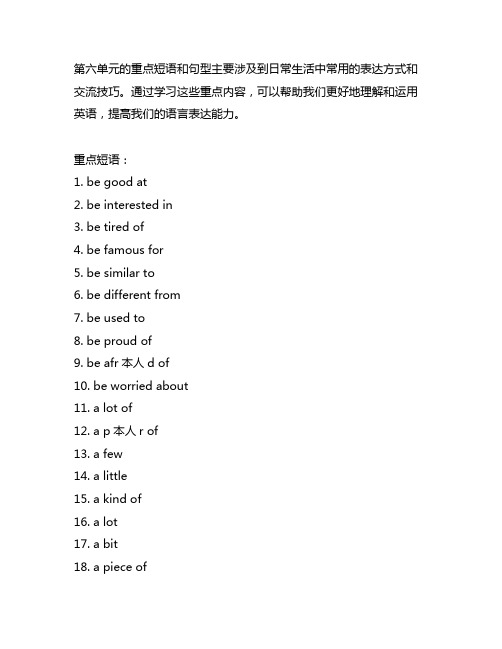
第六单元的重点短语和句型主要涉及到日常生活中常用的表达方式和交流技巧。
通过学习这些重点内容,可以帮助我们更好地理解和运用英语,提高我们的语言表达能力。
重点短语:1. be good at2. be interested in3. be tired of4. be famous for5. be similar to6. be different from7. be used to8. be proud of9. be afr本人d of10. be worried about11. a lot of12. a p本人r of13. a few14. a little15. a kind of16. a lot17. a bit18. a piece of19. a set of20. a number of以上这些短语在日常交流中经常用到,掌握了这些短语可以使我们的表达更加准确和丰富。
另外,第六单元还涉及到一些重要的句型,例如:1. What are you going to do this weekend?2. I'm going to…3. What would you like to do?4. I'd like to…5. How do you like these shoes?6. I like them very much.7. What about going to the zoo?8. That sounds like a good idea.掌握这些句型可以帮助我们更好地进行日常交流,说出自己的想法和打算。
以上是九年级英语第六单元的重点短语和句型,通过认真学习和练习,我们一定可以掌握这些内容,提高我们的英语水平。
祝大家学习进步,早日成为优秀的英语学习者!九年级英语第六单元的重点短语和句型作为日常英语交流中必不可少的一部分,对于学生们来说具有重要的意义。
在学习英语的过程中,掌握这些重点内容不仅可以帮助我们更好地理解和运用英语,还能提高我们的语言表达能力,为日常交流打下坚实的基础。
人教版九年级英语全一册知识梳理第六单元《Unit 6 Section A》
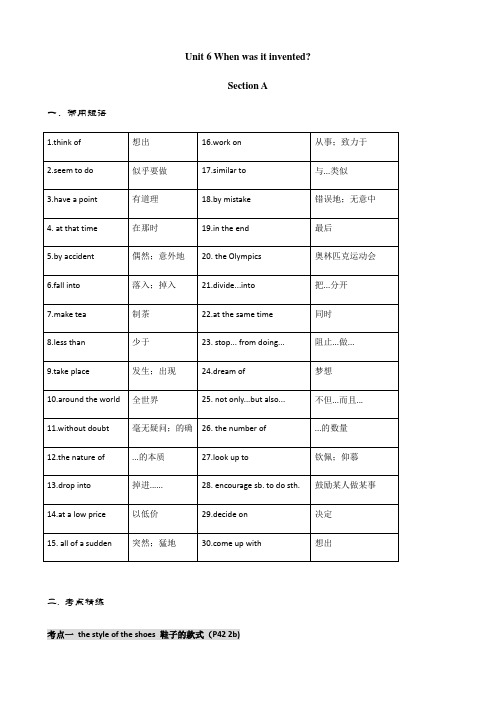
Unit 6 When was it invented?Section A一.常用短语二.考点精练考点一the style of the shoes 鞋子的款式(P42 2b)(1)style词性_________,意为__________。
常用短语in style意为“时髦的”,其反义短语为_____________,意为“过时的”。
名词/“样式;款式”/out of style☑ This year's style in dresses is different from last year's.今年的裙子样式与去年的不同。
☑ Her clothes are always in style.她的衣服总是很时髦。
(2)style 做名词,还可意为___________。
“方式”☑ Our children need new learning styles.我们的孩子需要新的学习方式。
考点二With pleasure! 非常愿意!(P42 2d)pleasure词性_________,意为___________。
名词/“高兴;愉快”☑ Watching the 2016 Summer Olympics gave him great pleasure.观看2016年夏季奥运会给他以极大的愉悦。
【辨析】with pleasure与my pleasure☑-Could you help me with my English?你能帮我学习英语吗?-With pleasure.当然可以。
☑ Thanks for helping me.谢谢你帮助了我。
-My pleasure./It's a pleasure.别客气。
考点三Think about how often it's used in our daily lives. 想想看,在我们的日常生活中它被使用得多么频繁。
(P42 2d)daily此处词性为_________,意为___________。
九年级UNIT6单元短语句子
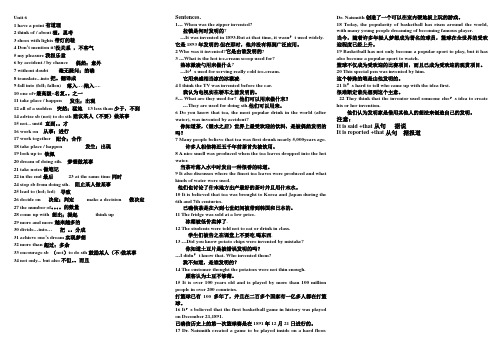
Unit 61 have a point有道理2 think of / about想,思考3 shoes with lights带灯的鞋4 Don’t mention it!没关系,不客气5 my pleasure我很乐意6 by accident / by chance 偶然;意外7 without doubt 毫无疑问;的确8 translate...into把。
翻译成9 fall into (fell; fallen)落入…;陷入….10 one of+最高级+名复。
之一11 take place / happen 发生;出现12 all of a sudden 突然;猛地13 less than少于,不到14 advise sb (not) to do sth建议某人(不要)做某事15 not... until 直到。
才16 work on 从事;进行17 work together 配合;合作18 take place / happen 发生;出现19 look up to 钦佩20 dream of doing sth. 梦想做某事21 take notes做笔记22 in the end最后23 at the same time同时24 stop sb from doing sth. 阻止某人做某事25 lead to (led; led) 导致26 decide on 决定;判定make a decision 做决定27 the number of。
的数量28 come up with 想出;提起think up29 more and more越来越多的30 divide…into…把。
分成31 achieve one’s dream实现梦想32 more than超过;多余33 encourage sb (not)to do sth鼓励某人(不)做某事34 not only... but also不但。
Unit6Whenwasitinvented_重点短语句子及其运用2023-2024学年人教版英语九
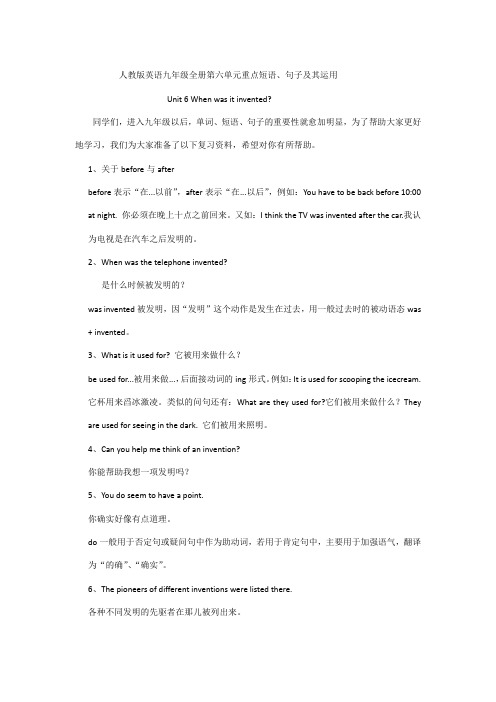
人教版英语九年级全册第六单元重点短语、句子及其运用Unit 6 When was it invented?同学们,进入九年级以后,单词、短语、句子的重要性就愈加明显,为了帮助大家更好地学习,我们为大家准备了以下复习资料,希望对你有所帮助。
1、关于before与afterbefore表示“在...以前”,after表示“在...以后”,例如:You have to be back before 10:00 at night. 你必须在晚上十点之前回来。
又如:I think the TV was invented after the car.我认为电视是在汽车之后发明的。
2、When was the telephone invented?是什么时候被发明的?was invented被发明,因“发明”这个动作是发生在过去,用一般过去时的被动语态was + invented。
3、What is it used for? 它被用来做什么?be used for...被用来做...,后面接动词的ing形式。
例如:It is used for scooping the icecream.它杯用来舀冰激凌。
类似的问句还有:What are they used for?它们被用来做什么?They are used for seeing in the dark. 它们被用来照明。
4、Can you help me think of an invention?你能帮助我想一项发明吗?5、You do seem to have a point.你确实好像有点道理。
do一般用于否定句或疑问句中作为助动词,若用于肯定句中,主要用于加强语气,翻译为“的确”、“确实”。
6、The pioneers of different inventions were listed there.各种不同发明的先驱者在那儿被列出来。
were listed被列出来,一般过去时的被动语态。
新译林版英语九年级上册第六单元单元重点语言点讲解
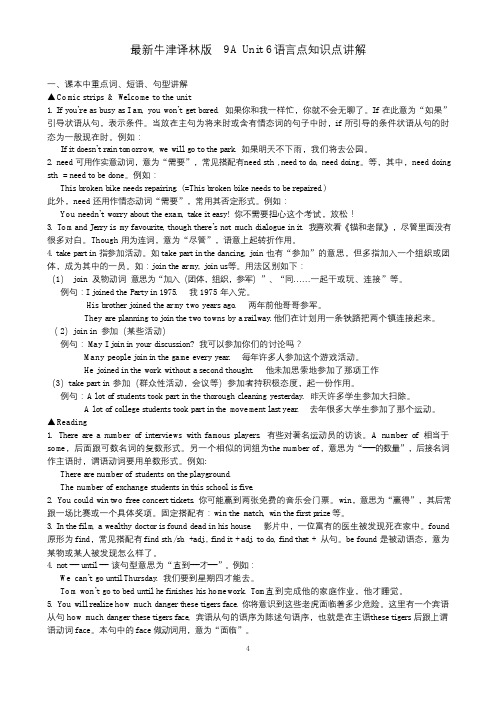
最新牛津译林版9A Uni t 6语言点知识点讲解一、课本中重点词、短语、句型讲解▲Co mic s tr ips & Welco me to the uni t1.I f you’re as busy a s I am, you won’t ge t bored.如果你和我一样忙,你就不会无聊了。
I f在此意为“如果”引导状语从句,表示条件。
当放在主句为将来时或含有情态词的句子中时,i f所引导的条件状语从句的时态为一般现在时。
例如:I f i t doesn’t ra in tom orrow, we wi l l go to the park.如果明天不下雨,我们将去公园。
2. need可用作实意动词,意为“需要”,常见搭配有need s th.,need to do, need do ing。
等,其中,need do i ng s th. = need to be done。
例如:This b roken b ike needs repa i r ing.(=This b roken b ike needs to be repa i red.)此外,need还用作情态动词“需要”,常用其否定形式。
例如:You needn’t wor ry abou t the exam,t a ke i t easy!你不需要担心这个考试,放松!3. To m and Je r ry i s my favour i t e,though the re’s no t much d ia logue in i t.我喜欢看《锚和老鼠》,尽管里面没有很多对白。
Though用为连词,意为“尽管”,语意上起转折作用。
4.t ake par t in指参加活动。
如take par t in the danc ing,jo in也有“参加”的意思,但多指加入一个组织或团体,成为其中的一员。
如:jo in the a rmy,jo in us等。
人教版九年级英语第六单元重点短语及句型知识点小结
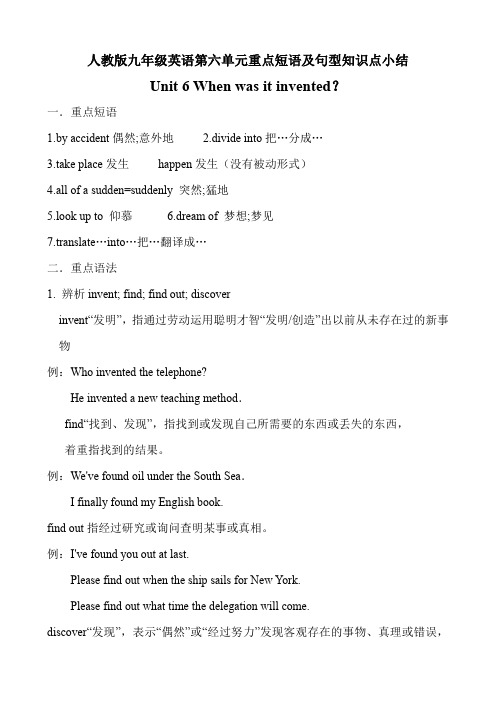
人教版九年级英语第六单元重点短语及句型知识点小结Unit 6 When was it invented?一.重点短语1.by accident偶然;意外地2.divide into把…分成…3.take place发生happen发生(没有被动形式)4.all of a sudden=suddenly 突然;猛地5.look up to 仰慕6.dream of 梦想;梦见7.translate…into…把…翻译成…二.重点语法1. 辨析invent; find; find out; discoverinvent“发明”,指通过劳动运用聪明才智“发明/创造”出以前从未存在过的新事物例:Who invented the telephone?He invented a new teaching method.find“找到、发现”,指找到或发现自己所需要的东西或丢失的东西,着重指找到的结果。
例:We've found oil under the South Sea.I finally found my English book.find out指经过研究或询问查明某事或真相。
例:I've found you out at last.Please find out when the ship sails for New York.Please find out what time the delegation will come.discover“发现”,表示“偶然”或“经过努力”发现客观存在的事物、真理或错误,即指发现原来客观存在但不为人所知的事物,也可表示发现已为人所知的事物的新的性质或用途。
Columbus discovered America in1492.We soon discovered the truth.我们很快就弄清了真相。
【练习】a.Edison ____the electric lamp.b.I lost my necklace last night.I haven’t ____it.c.Who ____America first?d.Can you ____what time the train leaves?2.一般过去时的被动语态(见P188页)结构:was/were+过去分词【练习】( ) 1. People's Republic of China __ on October 1, 1949.A. foundB. was foundedC. is foundedD. was found( ) 2. English ____ in Canada.A. speaksB. are spokenC. is speakingD. is spoken( ) 3 This English song __ by the girls after class.A. often singsB. often sangC.is often sangD.is often sung( ) 4 This kind of car___ in Japan.A. makesB. madeC. is makingD. is made( ) 5 Computers ___ all over the world.A. is usedB. are usingC. are usedD. have used。
九年级上册英语第六单元2b
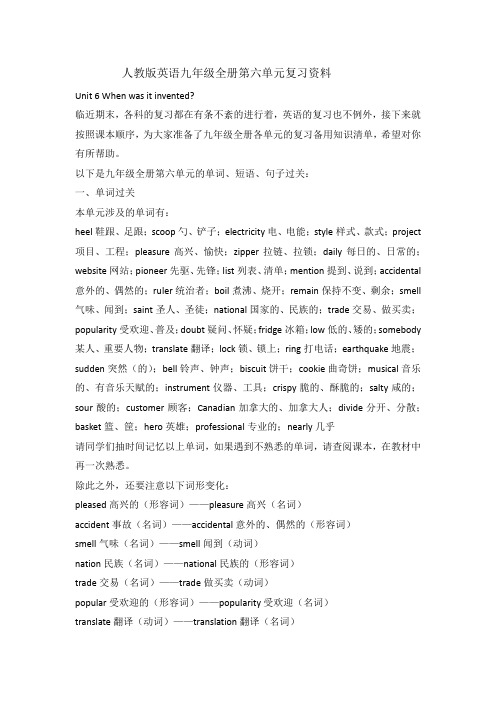
人教版英语九年级全册第六单元复习资料Unit 6 When was it invented?临近期末,各科的复习都在有条不紊的进行着,英语的复习也不例外,接下来就按照课本顺序,为大家准备了九年级全册各单元的复习备用知识清单,希望对你有所帮助。
以下是九年级全册第六单元的单词、短语、句子过关:一、单词过关本单元涉及的单词有:heel鞋跟、足跟;scoop勺、铲子;electricity电、电能;style样式、款式;project 项目、工程;pleasure高兴、愉快;zipper拉链、拉锁;daily每日的、日常的;website网站;pioneer先驱、先锋;list列表、清单;mention提到、说到;accidental 意外的、偶然的;ruler统治者;boil煮沸、烧开;remain保持不变、剩余;smell 气味、闻到;saint圣人、圣徒;national国家的、民族的;trade交易、做买卖;popularity受欢迎、普及;doubt疑问、怀疑;fridge冰箱;low低的、矮的;somebody 某人、重要人物;translate翻译;lock锁、锁上;ring打电话;earthquake地震;sudden突然(的);bell铃声、钟声;biscuit饼干;cookie曲奇饼;musical音乐的、有音乐天赋的;instrument仪器、工具;crispy脆的、酥脆的;salty咸的;sour酸的;customer顾客;Canadian加拿大的、加拿大人;divide分开、分散;basket篮、筐;hero英雄;professional专业的;nearly几乎请同学们抽时间记忆以上单词,如果遇到不熟悉的单词,请查阅课本,在教材中再一次熟悉。
除此之外,还要注意以下词形变化:pleased高兴的(形容词)——pleasure高兴(名词)accident事故(名词)——accidental意外的、偶然的(形容词)smell气味(名词)——smell闻到(动词)nation民族(名词)——national民族的(形容词)trade交易(名词)——trade做买卖(动词)popular受欢迎的(形容词)——popularity受欢迎(名词)translate翻译(动词)——translation翻译(名词)sudden突然的(形容词)——suddenly突然地(副词)music音乐(名词)——musical音乐的(形容词)二、短语过关本单元在单词表中出现的短语:1、have a point 有道理2、by accident 偶然、意外地3、take place 发生、出现4、without doubt 毫无疑问5、all of a sudden 突然、猛地6、by mistake 错误地、无意中7、the Olympics 奥林匹克运动会8、divide … into … 把……分开9、not only … but also … 不仅……而且……10、look up to … 钦佩、仰慕课文中出现的重点短语:1、shoes with special heels 带有特别后跟的鞋子2、be used for doing sth. 被用来做某事3、With pleasure! 很荣幸4、daily lives 日常生活5、at that time 在那个时候6、be widely used 被广泛使用7、the first one to do sth. 第一个做某事的人8、a few thousand years later 几千年以后9、less than 少于10、even though 即使11、at a low price 以一个超低的价格12、advise sb. not to do sth. 建议某人不作某事13、go out alone 独自外出14、in the end 最后15、potato chips 薯片16、more than 超过17、in history 在历史上11、at the Olympics 在奥运会上18、be born 出生19、teach sb. to do sth. 教某人做某事20、work together 一起努力21、stop sb. from doing sth. 阻止某人做某事22、around the world 全世界23、encourage sb. to do sth. 鼓励某人做某事24、achieve one’s dream 实现某人的梦想三、句子过关1、Shoes with special heels are used for changing the sty le of the shoes.具有特别后跟的鞋子用来调整鞋的样式。
九年级上册英语第6单元笔记

九年级上册英语第6单元笔记一、重点短语1. used to do 过去常常做某事2. be used to doing sth 习惯做某事3. be used for 被用来做某事4. be used as 被当作……使用5. the opposite of …的相反词6. in the opposite way 以相反的方式7. in the same way 以同样的方式8. in the past 在过去9. most of the time 大部分时间10. at the beginning of 在……开始的时候11. at the end of 在……结束的时候12. make sb do sth 让某人做某事13. feel sb doing sth 感觉到某人正在做某事14. sound like 听起来像15. in the future 在将来16. be different from 与……不同17. in one’s opinion 在某人看来18. according to 根据19. no longer 不再20. not…any more 不再21. as well 也,又,同样地22. in the same way 用同样的方式23. go to sleep 入睡24. wake up 醒来,叫醒25. turn off 关掉(电器)26. take off 起飞,脱下,取消,移除,让……休息27. fall asleep 入睡,睡着28. be asleep 在睡着的状态中(表状态)29. go to bed 上床睡觉,就寝(表动作)30. get up 起床(表动作)31. stay up 熬夜,不睡觉,坚持,保持(表状态)32. all the time 一直,始终,屡屡(置于动词、形容词、副词之后)33. on time 按时,准时。
副词形式:时间处于合适的时间点;介词形式:某事处于合适的时间点。
九年级英语上册第六单元知识点

九年级英语上册第六单元知识点Unit 6 When was it invented?一.重点短语1.It's my pleasure.=My pleasure.我的荣幸2.seem+to+动词原形好像做某事3.such a great invention如此伟大的一项发明4.think of=think about想到,考虑5.in our daily lives在我们的日常生活中6.in my daily life在我的日常生活中7.have a point有道理8.by accident偶然地,意外地9.over an open fire在篝火上10.it mentioned that它提到11.It is said that据说12.It is believed that人们相信13.fall into(过去式fell into)=drop into掉进…14.in the 19th century在19世纪15.spread to other countries传播到其他国家16.at a low price以很低的价格17.bring(brought)sth.to sp.把某物带到某处18.all of a sudden突然地19.less than少于,不到more than=over超过20.without doubt毫无疑问21.at that time在那时22.advise sb(not)to do sth建议某人(不要)做某事23.start doing sth开始做某事24.work on sth致力于某事25.(be)similar to与……相似26.the Olympics奥运会27.by mistake错误地,无意地28.make a mistake犯错29.divide...into…把…分成…30.in the end=at last=finally最后31.at the same time同时32.teach(taught)sb to do sth教某人做某事e up with想出34.encourage sb.to do sth.鼓励某人做某事35.the purpose of……的目的36.stop sb from doing sth阻止某人做某事37.look up to sb.钦佩某人38.look up the word查找单词39.work together一起工作40.I want to achieve my dream.我想实现梦41.My dream will come true.我的梦想会实现42.work hard努力工作43.on a hard floor在坚硬的地板上44.lead to导致leader领导,引路人45.Don't mention it.不客气,不用谢46.translate...into....把…翻译成…47.be used for doing sth=be used to do sth48.dream of doing sth梦想做某事二.句型用法1.be used to do被用来做某事be used as被用作…be used by sb.被某人使用2.help sb do sth.=help sb.to do sth.帮助某人做某事3.make a decision to do sth.=decide to do sth.决定做某事4.make sb.+adj.使某人怎么样make sb do sth使某人做某事be made to do sth被使唤去做某5..in this way这样,用这种方式三.语法全解1.some time一段时间sometimes有时some times几次sometime某个时候2.one of the world's favorite drinks世界最受欢迎的饮料之一.one of…之一,后面的名词用复数(一般要加S),动词用单数(一般要加S);favorite,最喜欢的,前面要用―谁的‖.3.thousand千hundred百million百万,当它们前面有数字的时候,它们本身不能加S,当它们后面有of的时候它们要加S,但前面的数字和后面的of不能同时存在4.not…until直到…才,I don't go to sleep until 11 every day.我每天直到11点才睡觉。
九年级英语上册第六单元重要知识点总结

九年级英语上册第六单元重要知识点总结九年级英语上册第六单元重要知识点总结Unit6Whenwasitinvented?【重点短语】1.byaccident偶然地;意外地2.withoutdoubt毫无疑问的;的确3.byistae错误地4.looupto钦佩;仰慕5.taeplace发生;出现6.allofasudden突然;猛地7.divide…into…把……分成......8.theolypics奥林匹克运动会9.thestyleof……的样式10.beusedfor被用于……【考点详解】1.inventv.发明inventorn.发明家inventionn.发明2.beusedfordoing用来做…(是被动语态)(这个短语的考点有两点,一是usedfor的意思,二是for后面用动名词) Pensareusedforwriting.笔是用来写的。
3.给某人某样东西givesth.tosb.Igaveapentohi.我给他一支笔。
givesb.sth.Igavehiapen.我给他一支笔。
4.allday整天5.saltyadj.咸的saltn.盐6.byistae错误地(犯错:aeistae,这些常见的短语大家务必要掌握)Itootheubrellabyistae.我不小心拿错了雨伞。
8.byaccident意外,偶然(常见短语,考的最多的是它的意思)Ietherbyaccidentatbusstop.我在公共汽车站意外地见到了她。
9.not…until…直到…才…(重中之重,这个用法非常重要!)Ididn’tgotobeduntilIfinishedywor.我直到完成我的工作才去睡觉。
10.accordingto+名词,根据…accordingtothisarticle根据这篇文章11.overanopenfire野饮12.leafn.叶子复数形式leaves13.nearbyadj.附近的14.fallinto落入,掉进Theleaffellintotheriver.叶子落入了河里。
人教版九年级英语unit 6重点短语句子归纳(中考读背材料)

Unit 6 When was it invented?重点短语句子1.invent v. 发明,创造inventor n.发明者,发明家invention n.发明,发明物2.style n.样式,款式,风格in style=in fashion 流行,时髦out of style=out of fashion 过时3.please 请,(使)高兴/满意pleased adj.高兴的,满意的pleasant adj.令人愉快的pleasure n.愉快,高兴,快乐的事for pleasure 为了娱乐,消遣With pleasure.乐意效劳(用来回答请求帮忙) It’s a pleasure./A pleasure.It’s my pleasure./My pleasure.不用谢(用来回答感谢)4. in our daily life/lives 在日常生活中5. point n.要点,得分have a point 有道理point out指出point at指着point to指向6. mention … to sb. 向某人提及…mention doing sth 提及做某事7. bring…to sw. 把…带到某地be brought to sw. 被带到某地bring out the best in sb. 使某人显露出最好的一面8. shoes with special heels带特别鞋跟的鞋子9. run v.跑,管理,经营,运行run on electricity通电运行10. be used to do/be used for doing 被用于做11. change the style of the shoes改变鞋子的款式12. serve v.服务,提供,端上serve sth 提供某物serve sb. (with)sth. 给某人端上serve as 作为,充当,起…作用13. small inventions that changed the world改变世界的小发明14. such a great invention=so great an invention这么伟大的发明15. at that time 在那时,当时16. spread to(spread…to…把…传播到)17. accident n.事故,意外事件accidental adj. 偶然的,意外的by accident=by chance 偶然地,意外地by mistake错误地,无意地18.boil drinking water烧开水boiling water 正在沸腾的水boiled water 烧开的水19.over an open fire在户外的火上20.fall/drop into 落入,掉入fall down(from...)滑倒,倒下fall over 向前摔倒fall off 跌落,从…上掉下来fall behind 落后,跟不上fall in love with 爱上...21.sb./sth. remain+n./adj./介词短语保持,仍然是…remain doing 继续做…sth. remain to be done 留待…sth/sb remain 停留,留下22.a nice/pleasant smell一种好闻的气味(n.)smell nice/good 闻起来很好(v.)23.a good taste好品味/味道taste delicious 尝起来美味24.the saint of tea/poem/chess茶圣/诗圣/棋圣25. produce a product生产商品26.in less than 100 years在不到一百年的时间里27. take place发生,举办sth. happen to sb.某事发生在某人身上(偶然或突然发生的事)happen to do sth.碰巧做某事28. translate… into 把...翻译成29. all of a sudden=suddenly 突然地30. ring the bell 按响门铃ring sb up给某人打电话31. musical instrument 乐器32. the nature of tea茶道33. without/no doubt毫无疑问sb. doubt if/whether…sb. don’t doubt that…Do you doubt that…(宾语从句中,肯定句连接词用if/whether 否定句和疑问句用that)34.the 6th and 7th centuries公元六,七世纪35.the tea trade茶叶贸易(tea is traded.)36.at a low /high/special price以低/高/特价37.raise/lower the heels升高/降低鞋跟38.salty and crispy又咸又脆39.break the rule/law违反规定/法律break in 打断(谈话),闯入break into 闯入,破门而入break into tears 突然大哭,放声大哭break into laughter突然大笑,哄堂大笑break down 发生故障,失败,分解崩溃,身体垮掉break up 打碎,破碎;结束;解散break out 爆发,突发break off 折断,突然停止,暂停40.an instrument similar to a telephone类似电话的乐器41.today in history历史上的今天42.adj.+enoughenough +n.43.in the end/at last/finally 终于,最后44.Be born in…出生于…45.divide…into…把…分成…be divided into …被分成…46.at the same time 同时47.the popularity of……的普及48.It is said/believed/heard/reported that +从句据说/据可信消息/据听说/据报道49.sour/sweet/bitter/hot/salty酸/甜/苦/辣/咸50.mind map思维导图51.stop/keep/prevent/protect…from doing…阻止/防止…做…52.dream of/about (doing) sth.梦到/梦想(做)某事53.the number of……的数目a number of 大量,许多54.look up to 仰视,钦佩look down on/upon 看不起,轻视look up 查阅,查询,抬头看look into 调查look through 浏览,温习,仔细查看look out 当心,小心look forward to 盼望look around 环顾四周look back 回头看,回顾look over 检查,察看,从上面看look away 转移目光55.become like sb. 成为像某人那样的人56.achieve/realize one’s dream实现梦想dream comes true梦想实现57.encourage sb. to do sth.鼓励某人做某事58.a popular game to watch/play 人们喜欢观看的/参与的运动59.on a hard floor在硬地板上60.work together合作(team work团队合作)61.the competing team竞争队伍62.fried chips薯片,薯条63.professional adj.职业的,专业的profession n. 职业,专业64.the first sentence that was said on the telephone (世界上)电话里说的第一句话65.the development of ……的发展66.make a list of…列出…的清单take/make notes 记笔记make up 弥补,组成,化妆,整理make for 导致,有助于make sense 有意义,讲得通make out 理解,辨认出make sure 确信make use of 使用,利用make a difference 有影响,有关系make sb. do sth. 让某人做某事be made to do sth. 被迫做某事make sb. done 让某人被…make sb. /sth. +adj. 使某人…make sb. sth.=make sth. for sb.为某人制作某物make sb. sb. 使某人成为某人67.have sb. do sth. 让某人做某事have sth. done 让别人做某事68.someone else’s idea 别人的想法69.The purpose of……的目的70.not only…but also…不仅…而且…。
九年级英语第六单元

九年级英语第六单元一、重点单词。
1. prefer.- 用法:prefer sth.(更喜欢某物);prefer doing sth.(更喜欢做某事);prefer to do sth.(宁愿做某事);prefer sth. to sth.(比起……更喜欢……)。
例如:I prefer apples to bananas.(比起香蕉我更喜欢苹果。
)2. lyrics.- 名词,意为“歌词”。
例如:I like the lyrics of this song.(我喜欢这首歌的歌词。
)3. smooth.- 形容词,“平滑的;悦耳的”。
例如:The music is very smooth.(这音乐很悦耳。
)4. spare.- 形容词,“空闲的;不用的”;也可作动词,“抽出;匀出”。
例如:I have some spare time.(我有一些空闲时间。
);Can you spare me a few minutes?(你能匀给我几分钟吗?)5. director.- 名词,“导演;部门负责人”。
例如:The director of this movie is very famous.(这部电影的导演很有名。
)6. case.- 名词,在这里有“情况;实情”的意思。
例如:In that case, we should change our plan.(在那种情况下,我们应该改变我们的计划。
)7. war.- 名词,“战争;战争状态”。
例如:The two countries were at war.(这两个国家处于战争状态。
)8. stick.- 动词,“粘贴;将……刺入”,过去式和过去分词是stuck。
例如:Stick the picture on the wall.(把这幅画贴在墙上。
)9. down.- 形容词,“悲哀;沮丧”。
例如:He looks a bit down today.(他今天看起来有点沮丧。
九年级英语第六单元重要知识点归纳(整理打印版)

Unit6 When was it invented?【短语归纳】1.be used for doing=be used to do sth. 被用来做某事如:Pens are used for writing. = Pens are used to write. 笔是被用来写的。
2.be used as 被用作……,被作为……使用如:English is used as a foreign language in China. 英语在中国被作为一门外语使用。
3.be used by意为“被……使用”如:Erasers are often used by students to correct mistakes. 橡皮擦被学生们用来改正错误。
4.think 认为/ think of想起/ think about思考,考虑5.With pleasure =My pleasure. = It's a pleasure. =A pleasure. 我的荣幸;愿为你效劳6.in our daily lives 在我们的日常生活中7.强调句结构: 助动词do +谓语动词原形的确…如:He does look well. 他的确看起来气色很好。
8.seem to do sth. 似乎做某事9.have a point 有道理10.mention doing sth 提起做某事11.not to mention 更不用说; 还不算12.Don’t mention it. 不客气13.at that time 在那时/ at the same time 同时14.the style of ……的样式/风格15.by accident =by chance偶然; 意外的16.It is said that 据说……It's known that…众所周知……17.the first to do sth. 第一个做某事的人18.fall into =drop into 掉进;落入19.one of +名词复数:……之一one of + the +形容词的最高级+名词复数:最……之一20.remain doing sth 保持/仍是做某事21.the saint of tea 茶圣22.make tea 制茶23.It is believed that =People believ e that…人们认为/相信……24.not…until… 直到……才……25.less than 少于,比……少more than =over 多于,比……多26.take place 发生;出现27.in the 19th century 在19世纪28.without doubt 毫无疑问29.the nature of …的本质30.at a low price 以低价31.advise sb (not) to do sth 建议某人(不)做某事32.go out alone 独自外出33.all of a sudden 突然,猛地34.in the end =at last = finally 后来,最后,终于at the end of ... 在...... 末尾35.a much-loved and active sport 深受喜爱和充满活力的运动36.for fun and exercise 为了娱乐和锻炼37.the Olympics 奥林匹克运动会38.on a hard floor 在硬地板上39.divide…into把…分开40.stop sb. from doing slh. = prevent sb. from doing sth.阻止某人做事41.dream of = dream about 梦想;想象.dream of doing syh 梦想做某事42.not only…but also…不但……而且……43.the number of… …的数量/数目44.look up to 尊重,敬仰/ 抬头看(某人或某物);45.encourage sb to do sth 鼓励某人去做某事46.achieve the dreams 实现梦想(主语是人)dream will come true梦想会实现(主语是梦想等)47.decide on 决定e up with 想出,提出【语法归纳】1. 被动语态(1)被动语态基本结构:be+动词的过去分词(2)be 有人称、数和时态的变化。
人教版九年级上册英语unit6实用短语、句型
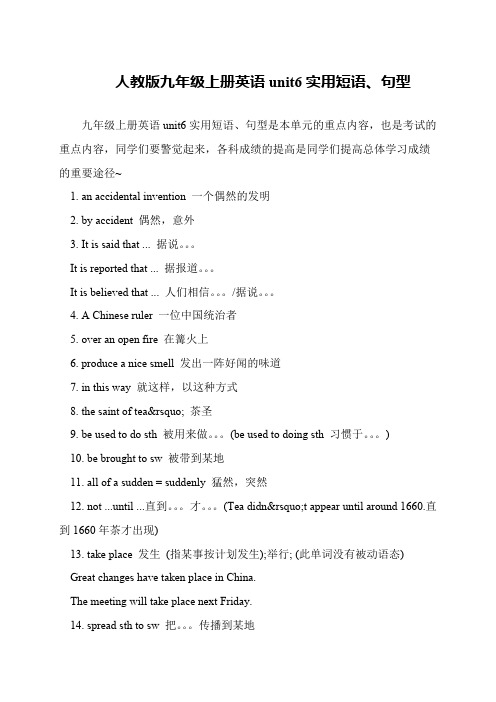
人教版九年级上册英语unit6实用短语、句型九年级上册英语unit6实用短语、句型是本单元的重点内容,也是考试的重点内容,同学们要警觉起来,各科成绩的提高是同学们提高总体学习成绩的重要途径~ 1. an accidental invention 一个偶然的发明 2. by accident 偶然,意外 3. It is said that ... 据说。
It is reported that ... 据报道。
It is believed that ... 人们相信。
/据说。
4. A Chinese ruler 一位中国统治者 5. over an open fire 在篝火上 6. produce a nice smell 发出一阵好闻的味道 7. in this way 就这样,以这种方式 8. the saint of tea’ 茶圣 9. be used to do sth 被用来做。
(be used to doing sth 习惯于。
) 10. be brought to sw 被带到某地 11. all of a sudden = suddenly 猛然,突然 12. not ...until ...直到。
才。
(Tea didn’t appear until around 1660.直到1660年茶才出现) 13. take place 发生(指某事按计划发生);举行; (此单词没有被动语态) Great changes have taken place in China. The meeting will take place next Friday. 14. spread sth to sw 把。
传播到某地。
人教版九年级全一册英语Unit6单元语法知识点总结
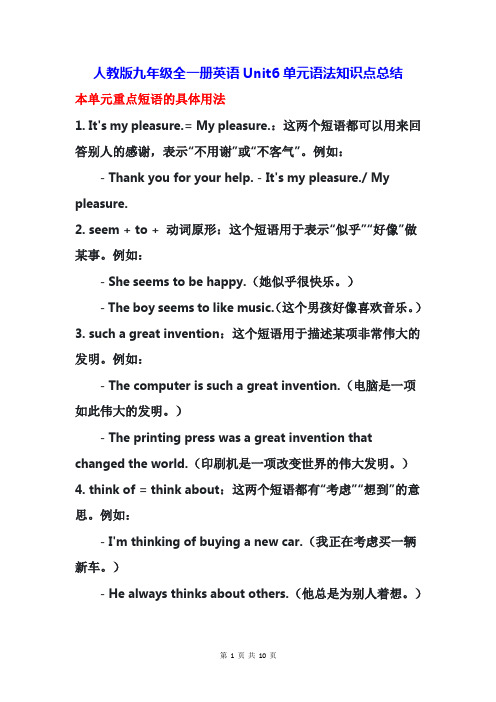
人教版九年级全一册英语Unit6单元语法知识点总结本单元重点短语的具体用法1. It's my pleasure.= My pleasure.:这两个短语都可以用来回答别人的感谢,表示“不用谢”或“不客气”。
例如:- Thank you for your help. - It's my pleasure./ My pleasure.2. seem + to + 动词原形:这个短语用于表示“似乎”“好像”做某事。
例如:- She seems to be happy.(她似乎很快乐。
)- The boy seems to like music.(这个男孩好像喜欢音乐。
)3. such a great invention:这个短语用于描述某项非常伟大的发明。
例如:- The computer is such a great invention.(电脑是一项如此伟大的发明。
)- The printing press was a great invention that changed the world.(印刷机是一项改变世界的伟大发明。
)4. think of = think about:这两个短语都有“考虑”“想到”的意思。
例如:- I'm thinking of buying a new car.(我正在考虑买一辆新车。
)- He always thinks about others.(他总是为别人着想。
)5. in our daily lives/ in my daily life:这两个短语用于描述在日常生活中的情况或活动。
例如:- Technology plays an important role in our daily lives.(科技在我们的日常生活中起着重要的作用。
)- In my daily life, I like to read books and exercise.(在我的日常生活中,我喜欢读书和锻炼。
人教版九年级英语第六单元Unit 6 section A+B知识点精讲

人教版九年级英语第六单元Unit 6 section A+B知识点精讲Section A单词1. style /staɪl/ n.样式;款式典例I like this style. 我喜欢这个样式。
短语in style流行的;时髦的out of style过时的2. project /'prɒdʒekt/ n.项目;工程助记人生无须大project(工程),快乐才是subject(主题),体验才是object(目标)典例an international science project国际科学项目Project Hope希望工程联想subject.主题object.目标3.pleasure /'pleʒə (r)/ n.高兴;愉快助记please(v.使愉快)去e+-ure(名词后缀)= pleasure典例to read for pleasure读书以自娱短语with pleasure当然了/很愿意for pleasure为了消遣;为了娱乐联想pleased adj.高兴的;满意的pleasing adj.令人高兴的;令人满意的谚语Pain past is pleasure.苦尽甘来。
4. daily /'deɪli/ adj.每日的;日常的助记day(n.一天)变y为i+ly(形容词后缀)= daily典例There was little change in their daily lives. 他们的日常生活几乎没有变化。
近义everyday adj.每天的拓展daily还可作名词,意为“日报”。
注意-ly一般用作副词后缀,但是有些以-ly结尾的词是形容词。
常见的词如下:lovely可爱的weekly每周的monthly每月的yearly每年的friendly友好的lonely孤独的5. website /'websaɪt/ n.网站助记web(n.网)+site(n.地点;场所)= website典例There are many websites on the Internet now.现在因特网上有许多网站。
人教版九年级英语第六单元知识点梳理
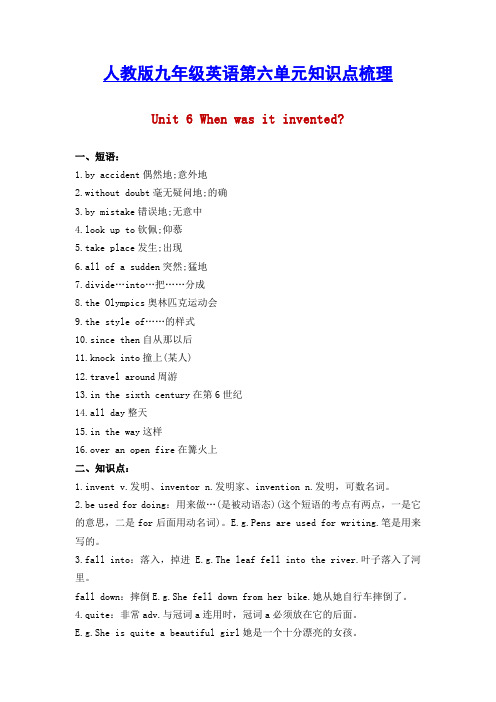
人教版九年级英语第六单元知识点梳理Unit 6 When was it invented?一、短语:1.by accident偶然地;意外地2.without doubt毫无疑问地;的确3.by mistake错误地;无意中4.look up to钦佩;仰慕5.take place发生;出现6.all of a sudden突然;猛地7.divide…into…把……分成8.the Olympics奥林匹克运动会9.the style of……的样式10.since then自从那以后11.knock into撞上(某人)12.travel around周游13.in the sixth century在第6世纪14.all day整天15.in the way这样16.over an open fire在篝火上二、知识点:1.invent v.发明、inventor n.发明家、invention n.发明,可数名词。
2.be used for doing:用来做…(是被动语态)(这个短语的考点有两点,一是它的意思,二是for后面用动名词)。
E.g.Pens are used for writing.笔是用来写的。
3.fall into:落入,掉进 E.g.The leaf fell into the river.叶子落入了河里。
fall down:摔倒E.g.She fell down from her bike.她从她自行车摔倒了。
4.quite:非常adv.与冠词a连用时,冠词a必须放在它的后面。
E.g.She is quite a beautiful girl她是一个十分漂亮的女孩。
5..pleased:adj.高兴的、满意的。
表示外部因素引起人发自内心的欣慰和愉快; pleasant:adj.令人愉快的、舒适的。
指天气、时间、旅行令人高兴和愉快; please:v.使高兴,使同意。
6.battery-operated:adj.电池控制的,是名词+动词的运动分词构成的合成形容词。
人教新目标九年级英语Unit 6单元知识梳理与归纳
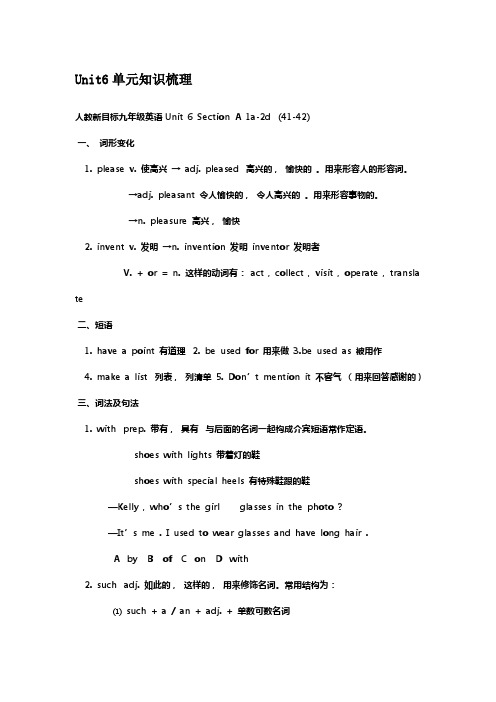
Unit6单元知识梳理人教新目标九年级英语Unit 6 Section A 1a-2d (41-42)一、词形变化1. please v. 使高兴→ adj. pleased高兴的,愉快的。
用来形容人的形容词。
→adj. pleasant 令人愉快的,令人高兴的。
用来形容事物的。
→n. pleasure 高兴,愉快2. invent v. 发明→n. invention 发明inventor 发明者V. + or = n. 这样的动词有:act , collect , visit , operate , transla te二、短语1. have a point 有道理2. be used for 用来做3.be used as 被用作4. make a list 列表,列清单5. Don’t mention it 不客气(用来回答感谢的)三、词法及句法1. with prep. 带有,具有与后面的名词一起构成介宾短语常作定语。
shoes with lights 带着灯的鞋shoes with special heels 有特殊鞋跟的鞋—Kelly , who’s the girl glasses in the photo ?—It’s me . I used to wear glasses and have long hair .A byB ofC onD with2. such adj. 如此的,这样的,用来修饰名词。
常用结构为:⑴ such + a / an + adj. + 单数可数名词=so + adj. + a / an + 单数可数名词This is such a nice horse . 这是一匹如此好的马。
=⑵ such + adj. + 复数可数名词There are such good books in the library .⑶ such + adj. + 不可数名词She has made such great progress in the exam .3. pleased adj. 高兴的,满意的be pleased with 对……高兴/ 满意I am pleased with your answer . 我对你的回答很满意。
- 1、下载文档前请自行甄别文档内容的完整性,平台不提供额外的编辑、内容补充、找答案等附加服务。
- 2、"仅部分预览"的文档,不可在线预览部分如存在完整性等问题,可反馈申请退款(可完整预览的文档不适用该条件!)。
- 3、如文档侵犯您的权益,请联系客服反馈,我们会尽快为您处理(人工客服工作时间:9:00-18:30)。
百度文库- 让每个人平等地提升自我
1 九年级英语第六单元短语和句子
used for doing sth = be used to do sth 被用来做某事 2. with pleasure乐意效劳
with lights有灯的鞋子 4. the style of the shoes鞋子的样式5. shoes with special heels有特殊鞋跟的鞋子to have a point似乎有道理
7. in our daily lives在我们的日常生活中8. at that time在那时
9. be used widely被广泛使用10. all of a sudden= suddenly突然;
11. it is said that... 据说……. 12. it is believed that…人们相信13. produce a nice smell 产生出一股香味14. the saint of tea茶圣
into.= drop into掉入brought to被带到
…until直到……才18. in less than 100 years在不到100年的时间里
19. take place发生(无被动语态)20 make the customer happy使顾客髙兴21. without doubt毫无疑问;的确22. the nature of tea茶的本质about tea culture了解茶文化 a low price以低的价格
25. by mistake无意中;错误地 a hard floor在坚硬的地板上
27. divide... into把......分成... from doing sth. 阻止……做某事
29. translate... into… 把……翻译成…popularity of tea 茶的普及
one’s dreams实现某人梦想only... but also... 不仅…而且…
33 .remain there for a some time 留在那里一段时间34. look up to钦佩仰慕
35. dream of doing sth 梦想干某事enough 够咸enough salt 足够的盐drink water over an open fire 在敞开的炉火上烧开水
38 .get a ball into the basket 把球投进篮子accident 偶然,意外地
40. so great an invention=such a great invention 如此了不起的一项发明
41. an accidental invention 一项偶然的发明42. encourage sb. to do鼓励某人做……
43.the number of... ……的数量(谓语动词用三单) a number of = many 许多(谓语动词用复数)句子
are they used for? 它们是用来做什么的?
-They are used for seeing in the dark. 它们是用来在黑暗中照明的。
2.-When was the telephone invented? 电话是什么时候发明的?
—I think it was invented in 1876. 我认为它是在1876年被发明的。
leaves from a tea plant fell into the water and remained there for some time 丛中的叶子落入水中并在里面泡了一段时间
much-loved and active sport is enjoyed by many for fun and exercise.
这种活跃的、受众人喜爱的运动被许多人作为娱乐和锻炼而欣赏。
5. It is believed that on December 21st ,1891, the first basketball game in history was played. 人们认为历史上的第一场篮球比赛是在1891年12月21日举行的。
you know when basketball was invented? 你知道篮球什么时候被发明的吗?
was tea brought to Korea? It was brought to Korea during the 6th and 7th centuries。
茶什么时候被带到朝鲜?它被带到朝鲜在六至七世纪期间。
8. When was it invented by? It was invented by Edison .
9. Do you know how potato chips were invented ? Potato chips were invented by a cook called George Crum.
你知道薯片什么时候被发明的?薯片是一个叫做乔治.克朗姆的厨师发明的。
10. I think the telephone was invented before the car. 我认为电话比小汽车发明得早。
Crum cooked them for a long time until they were crispy.
乔治.克朗姆煮了很长时间直到它们很脆了。
